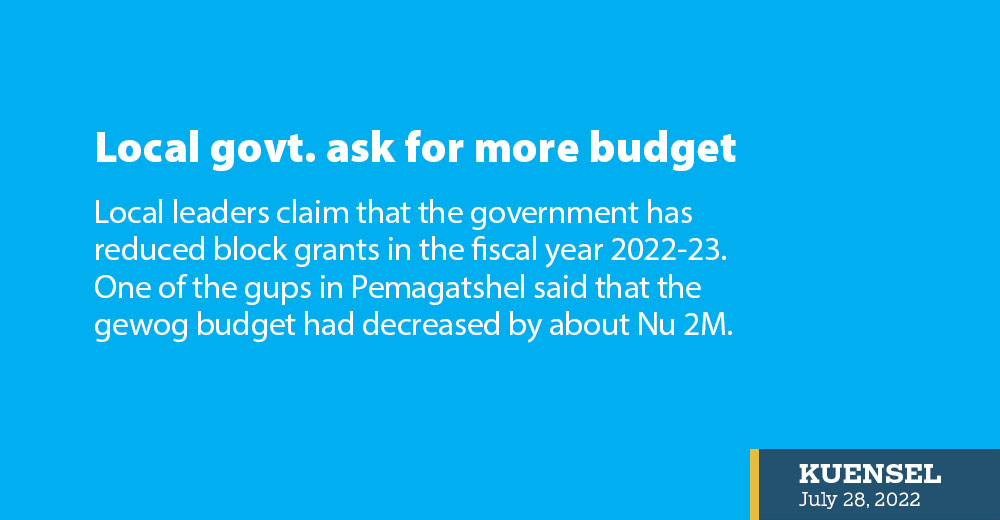MB Subba
Local leaders claim that the government has reduced block grants in the fiscal year 2022-23.
One of the gups in Pemagatshel said that the gewog budget had decreased by about Nu 2M.
The gewog received about Nu 20.95M in the fiscal year 2021-22. However, only Nu 18.539 has been allocated in the ongoing fiscal year, he said.
The gewog, he said, had proposed 37 activities in the fiscal year. The number of activities has been reduced to 30 due to budget constraints, he said.
“We need more money because our gewog is large and chiwogs are scattered,” he said.
The Dzongkhag Tshogdu (DT) chairperson of Dagana, Bal Bdr Rana, said that budget had decreased by about Nu 1 to Nu 2M for each gewog in his dzongkhag.
The chairperson said that farm roads have been destroyed by the recent flash floods. However, he added that the infrastructures would be restored with the “summer restoration fund”.
One of the gups in Samdrupjongkhar said that the recent flash floods had destroyed farm roads and other infrastructures and that a chunk of the budget would be utilised for the restoration of the infrastructures.
“We will have to spend a lot on the restoration of the infrastructures,” he said, adding that the current budget had also declined.
One of the gups in Tsirang also said that the budget had decreased slightly in his gewog.
He said that the budget that had been allocated as block grants was just enough for minor activities. He added that an additional budget was required for major activities such as blacktopping of rural roads.
He said that many roads needed to be blacktopped and maintained in the dzongkhag. “We may have to approach the finance ministry for an additional budget,” he said.
However, Trashigang DT chairperson and Yangyer gup, Duptho, said that the budget had not decreased in his gewog. He said that the gewog had proposed Nu 16M for the current fiscal year but that they received only Nu 14.9M.
“We received the same amount last year,” he said.
The budget will be used for activities that are needed for the community. “We will use the budget judiciously,” he said.
The DT chairperson of Trashiyangtse, Cheku, said that the budget had not increased from the previous year. “There are no new infrastructures to be undertaken and the money will be used for maintenance of the existing projects,” he said.
However, Finance Minister Namgay Tshering said that the capital budget had not been reduced. But he admitted that some gewogs would have received a reduced current budget due to the pandemic.
“It’s not a normal situation and there may have been some reduction in current budgets. But we have not reduced the capital budget,” he said.
Lyonpo said that the revenue had decreased and that it was just enough to meet recurrent expenditures.
According to the budget report 2022-23, the total budget for LGs has decreased by 12.5 percent in the fiscal year 2022-23.
The total budget allocation for local governments in the fiscal year is Nu 22.769 billion (B), which is 30 percent of the overall national budget, excluding the allocations for on-lending (government lending) and principal repayments, according to the annual budget presented in Parliament on June 6.
The total allocation for LGs in the fiscal year 2021-22 was Nu 26B.
The capital budget for local governments has also decreased to Nu 10B in the new fiscal year from Nu 13.235B in the previous fiscal year. In other words, the capital budget for local governments has decreased by 32 percent.
The overall capital budget, including that of the central governments, is higher than the recurrent budget. However, the capital budget allocated for local governments is Nu 2.74B less than the recurrent budget.


